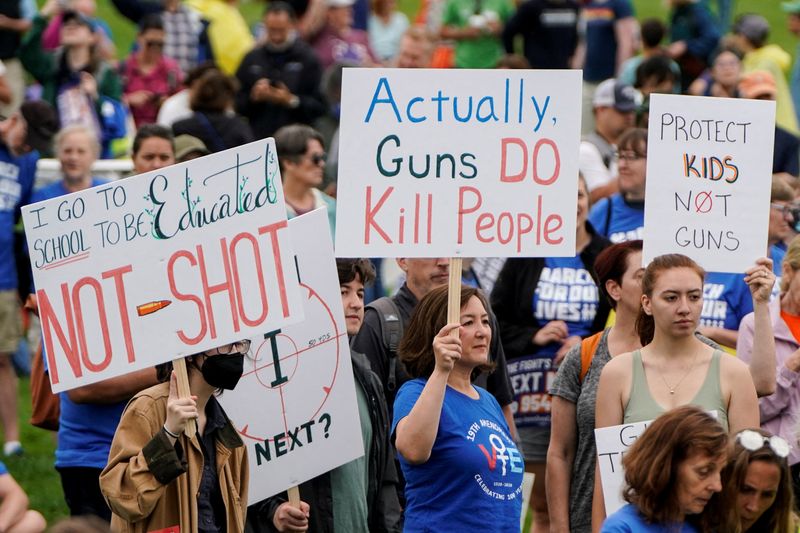By Richard Cowan
WASHINGTON (Reuters) -In a potential breakthrough toward the first significant new U.S. gun law in decades, a bipartisan group of senators on Sunday announced an agreement on a framework for a firearms safety bill with enough Republican support to advance in the narrowly divided Senate.
The plan, lauded by President Joe Biden, includes support for state "red flag" laws keeping firearms from potentially dangerous people, tougher criminal background checks for gun buyers under age 21 and a crackdown on "straw purchases" by people buying weapons for others who could not pass a background check.
Crafted in the aftermath of last month's massacres at an elementary school in Uvalde, Texas and a supermarket in Buffalo, New York, the framework is far less ambitious than proposals offered by Biden and other Democrats for banning semi-automatic, assault-style rifles and high-capacity magazines or at least raising the minimum age to buy those from 18 to 21.
Democratic Senator Chris Murphy, who led the negotiating effort alongside Republican Senator John Cornyn, said "the heavy lifting is behind us" after three weeks of intensive talks, though a "significant amount of work" remains. Murphy said he hoped for Senate passage by early August or sooner.
"We're going to get to work writing (legislative) text first thing (Monday) morning," Murphy told Reuters.
The deal was announced a day after tens of thousands of people rallied in Washington and around the United States to urge lawmakers to pass legislation to curb gun violence.
While an important breakthrough, the agreement does not ensure that legislation will be approved. Lawmakers still must hammer out legislative language that can attract enough votes to pass in both the Senate and House of Representatives, each narrowly controlled by Democrats.
Republican opposition has been instrumental in thwarting Democratic-backed gun control proposals in Congress dating back to the 1994 passage of an assault weapons ban that expired a decade later.
The United States has the highest rate of firearms deaths among the world's wealthy nations. But it is a country where many cherish gun rights and its Constitution's Second Amendment protects the right to "keep and bear arms."
Sunday's announcement marks the furthest that gun reform talks have advanced in Congress since 2013, when legislation failed on the Senate floor following a 2012 Connecticut elementary school massacre. Murphy, who represents Connecticut, has dedicated a major part of his decade-long Senate career to gun control following that tragedy.
"Our plan saves lives while also protecting the constitutional rights of law-abiding Americans," Murphy and Cornyn said in a joint statement.
The group agreeing to the framework included 10 Republicans, nine Democrats and one independent who caucuses with the Democrats.
A National Rifle Association spokesperson said the influential firearms rights group will not take a position on the framework until the detailed legislative text is finalized. She said the NRA would oppose any effort depriving Americans of their gun rights.
Gun control advocates painted Sunday's announcement as evidence of a weakening NRA, a group closely aligned with Republicans, amid rising public concern about gun violence.
"There had been conventional wisdom that politicians had bought into that you could not cross the NRA. Otherwise you would pay," said Christian Heyne, vice president of policy for the Brady gun control group, told Reuters.
FILIBUSTER THRESHOLD
With 10 Republicans indicating support, that would overcome the Senate's "filibuster" rule requiring 60 of the 100 senators to agree to advance most legislation. Republicans opposed to the plan are expected to mount procedural hurdles in a bid to block it.
Senate Republican Leader Mitch McConnell stopped short of embracing the framework but said he hoped for progress in the bipartisan talks.
Biden welcomed Sunday's agreement.
"It does not do everything that I think is needed, but it reflects important steps in the right direction, and would be the most significant gun safety legislation to pass Congress in decades," Biden said in a statement. "With bipartisan support, there are no excuses for delay, and no reason why it should not quickly move through the Senate and the House."
Senate Majority Leader Chuck Schumer said that he wanted to move a bill quickly once legislative details are finalized. House Speaker Nancy Pelosi also backed the deal, saying in a statement: "While more is needed, this package will take steps to save lives."
The measure would provide federal funding to encourage states to adopt "red flag" laws keeping guns away from people found by courts to be a significant danger to themselves or others.

Congress would provide more funding to expand mental health programs including ones run in schools, and would crack down on those who evade gun-licensing requirements or illegally buy guns on behalf of others - transactions called "straw purchases."
The plan also would require new government checks on those under 21 who try to buy guns so that juvenile mental health records can be reviewed, along with checks with state and local law enforcement agencies.